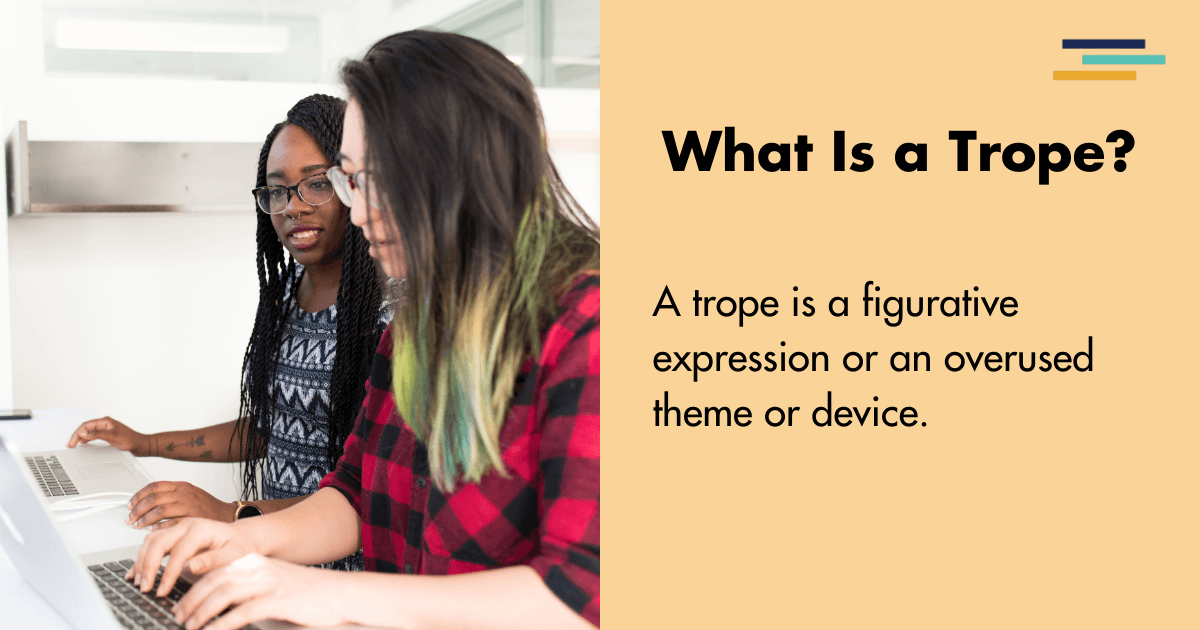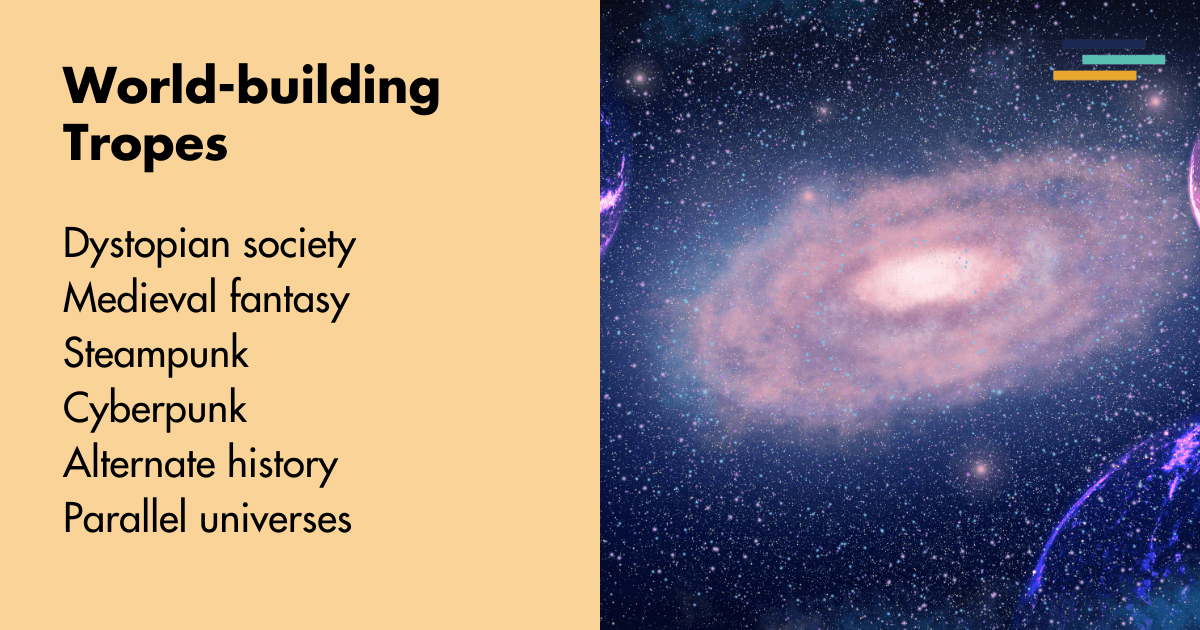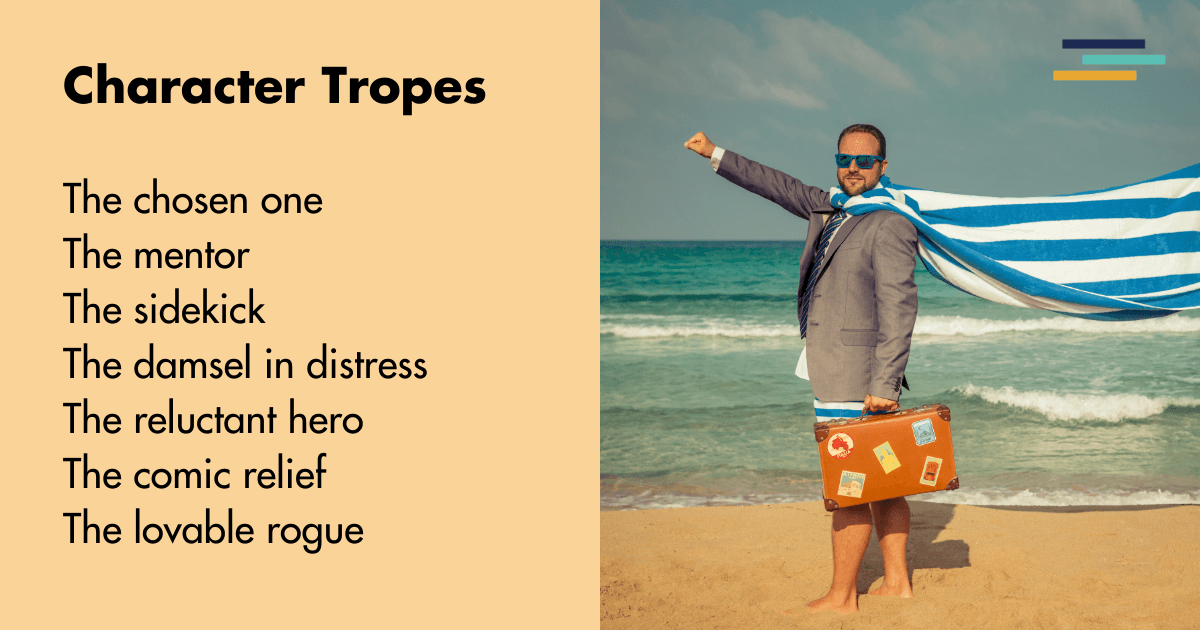
Ah, tropes. They can be an author’s best friend or their worst nightmare, but learning how to use them effectively is essential if you want to be a top rate storyteller.
Why do I say this?
Because, as you’ll learn throughout this article, tropes act as a shortcut for a lot of the things we do in writing. Tropes can spark ideas for world-building, character creation, and some genre tropes even have the plot baked in.
I know. It’s mad, but tropes really can do all that and more.
If you know anything about Fictionary, you know story comes first around here, which is why learning about tropes is so important. Because they help you enrich your stories, and level up your storytelling skills.
Before we look at some examples of specific tropes, let’s discover what a trope actually is.
What Is a Trope?
Tropes Definition
According to Merriam-Webster, a trope is “a word or expression used in a figurative sense,” or “a common or overused theme or device.”
Okay?
But what does that actually mean for my novel?
A solid question, and one I hope to answer by the end of this article.

What Is a Trope in Literature?
When writing novels, tropes exist as a kind of shorthand. They are common conventions (some would say cliches) authors use to help build the narrative, stir emotion, and add layers of familiarity for the reader.
Tropes are recurring themes, and easy to recognise story elements that help you build a framework for your story in record time.
Wait?
Tropes can do all that?
They sure can, my writerly friend.
Not only that, but—as you’ll see in later sections—you can use tropes to convey complex ideas in simple ways. Also, if you can nail tropes that are common for your genre, then you become a genre expert.
How cool is that?
I know. Cool, right?
Now you know what a trope actually is, and how you can use them to tell stories readers love, let’s look at some real-world examples of tropes so you can apply them to your writing.
Trope Examples
Note: These lists are not exhaustive, but will provide a good starting point for tropes around world-building, character creation, and genre (i.e., plot).
Word-building Tropes
World-building tropes are recurring themes or elements used to construct fictional universes. These can include specific settings, societal structures, and cultural norms. Some common world-building tropes include:
- Dystopian Society: A world characterized by oppressive government, environmental disaster, or other conditions leading to a degraded quality of life. Example: The Hunger Games by Suzanne Collins.
- Medieval Fantasy: A setting that mimics the Middle Ages, often featuring castles, knights, and magical elements. Example: A Song of Ice and Fire series by George R.R. Martin.
- Post-Apocalyptic World: A setting following a major catastrophe that has drastically changed civilization. Example: The Road by Cormac McCarthy.
- Steampunk: A world where steam power is predominant, often blending Victorian-era aesthetics with futuristic technology. Example: The Difference Engine by William Gibson and Bruce Sterling.
- Cyberpunk: A high-tech, low-life future where advanced technology coexists with societal decay. Example: Neuromancer by William Gibson.
- Space Opera: A grand, large-scale science fiction narrative often involving space travel and epic battles. Example: Dune by Frank Herbert.
- Alternate History: A world where historical events have diverged from our timeline, leading to a different present or future. Example: The Man in the High Castle by Philip K. Dick.
- Urban Fantasy: A setting where magical elements exist within a contemporary urban environment. Example: The Dresden Files by Jim Butcher.
- Mythical Kingdom: A realm inspired by mythology and folklore, often featuring gods, heroes, and fantastical creatures. Example: Percy Jackson & the Olympians series by Rick Riordan.
- Parallel Universes: Worlds existing alongside our own, with characters moving between distinct realities. Example: His Dark Materials series by Philip Pullman.

These tropes help writers create immersive worlds that captivate readers, providing familiar frameworks that you can adapt in unique and innovative ways.
Character Tropes
Character tropes are archetypes or common personality traits used to define characters in a story. They help readers quickly understand and connect with the characters. Common character tropes include:
- The Chosen One: A character destined to save the world or achieve greatness. Example: Harry Potter from the Harry Potter series by J. K. Rowling.
- The Mentor: A wise character who guides the protagonist. Example: Gandalf from The Lord of the Rings by J.R.R. Tolkien.
- The Anti-Hero: A protagonist who lacks traditional heroic qualities, often morally ambiguous. Example: Walter White from Breaking Bad.
- The Sidekick: A loyal companion who supports the main character. Example: Samwise Gamgee from The Lord of the Rings.
- The Damsel in Distress: A character who needs to be rescued, typically used to motivate the hero. Example: Princess Peach from the Super Mario series (Note: this trope is less common in modern literature, and is seen by some as cliche).
- The Reluctant Hero: A character who is hesitant to take on the hero’s role but rises to the occasion. Example: Frodo Baggins from The Lord of the Rings.
- The Femme Fatale: A seductive and mysterious woman who often brings trouble to the protagonist. Example: Catwoman from the Batman series.
- The Comic Relief: A character who provides humor in the story, often to ease tension. Example: Ron Weasley from the Harry Potter series.
- The Tragic Hero: A character with a fatal flaw that leads to their downfall. Example: Oedipus from Oedipus Rex by Sophocles.
- The Lovable Rogue: A charming and morally ambiguous character who often bends the rules. Example: Han Solo from the Star Wars series.
These tropes provide familiar frameworks you can adapt in unique and innovative ways, helping you create engaging and relatable characters.

Genre Tropes
Genre tropes are specific to the conventions of a particular genre, helping to define the expectations and characteristics of that genre. Some examples include:
Romance Tropes
- Enemies to Lovers: Characters who initially dislike each other but eventually fall in love. Example: Elizabeth Bennet and Mr. Darcy in Pride and Prejudice by Jane Austen.
- Love Triangle: A romantic situation involving three people, creating tension and conflict. Example: Bella, Edward, and Jacob in Twilight by Stephenie Meyer.
Horror Tropes
- The Final Girl: The last surviving woman who confronts the killer. Example: Laurie Strode in Halloween.
- Haunted House: A house occupied by ghosts or other supernatural beings. Example: The Haunting of Hill House by Shirley Jackson.
Science Fiction Tropes
- Artificial Intelligence: Robots or computers with human-like intelligence. Example: HAL 9000 in 2001: A Space Odyssey by Arthur C. Clarke.
- Time Travel: Characters moving backward or forward in time. Example: The Time Machine by H.G. Wells.
Fantasy Tropes
- Chosen One: A character destined to save the world or fulfill a great prophecy. Example: Harry Potter in Harry Potter series by J. K. Rowling.
- Quest: A journey or mission undertaken by the protagonist to achieve a specific goal. Example: Frodo’s journey to destroy ‘The One Ring’ in The Lord of the Rings by J.R.R. Tolkien.
Mystery Tropes
- Whodunit: A story centered on solving a crime, typically a murder. Example: Murder on the Orient Express by Agatha Christie.
- Locked-Room Mystery: A crime that appears impossible for someone to commit, with the scene being sealed off from the inside. Example: The Mystery of the Yellow Room by Gaston Leroux.
Thriller Tropes
- Conspiracy: Characters uncover a hidden and far-reaching plot. Example: The Da Vinci Code by Dan Brown.
- Race Against Time: The protagonist must complete a crucial task before a deadline. Example: 24 (television series).
Historical Fiction Tropes
- Star-Crossed Lovers: Lovers whose relationship is doomed by external circumstances. Example: Romeo and Juliet by William Shakespeare.
- Epic Battle: Large-scale conflicts that play a crucial role in the story. Example: War and Peace by Leo Tolstoy.
Dystopian Tropes
- Oppressive Regime: A totalitarian government controlling every aspect of life. Example: 1984 by George Orwell.
- Rebellion: Characters rising against an oppressive system. Example: The Hunger Games by Suzanne Collins.
Western Tropes
- Gunslinger: A skilled shooter and drifter often involved in duels. Example: The Dark Tower series by Stephen King.
- Frontier Justice: Characters taking the law into their own hands in a lawless environment. Example: True Grit by Charles Portis.
Comedy Tropes
- Mistaken Identity: Characters are mistaken for someone else, leading to humorous situations. Example: The Comedy of Errors by William Shakespeare.
- Fish Out of Water: You place your character in an unfamiliar situation, often leading to comedic misunderstandings. Example: The Hitchhiker’s Guide to the Galaxy by Douglas Adams.
By understanding and using these tropes, authors can meet readers’ genre expectations while adding their own creative twists to the narrative.
Should You Use Tropes in Writing?
Using tropes in writing can be beneficial because they provide a familiar framework that can help in storytelling. Tropes allow writers to establish settings, characters, and plot dynamics that readers can easily understand and connect with.
However, relying too heavily on tropes can lead to predictable and clichéd narratives.
And finally, always remember that story comes first. Use tropes to help you:
- Create engaging characters
- Pen interesting plots
- Structure solid settings
A tool like Fictionary helps you turn your draft into an interesting story readers love. So, with the right tropes and a strong narrative foundation, your writing can truly shine.


